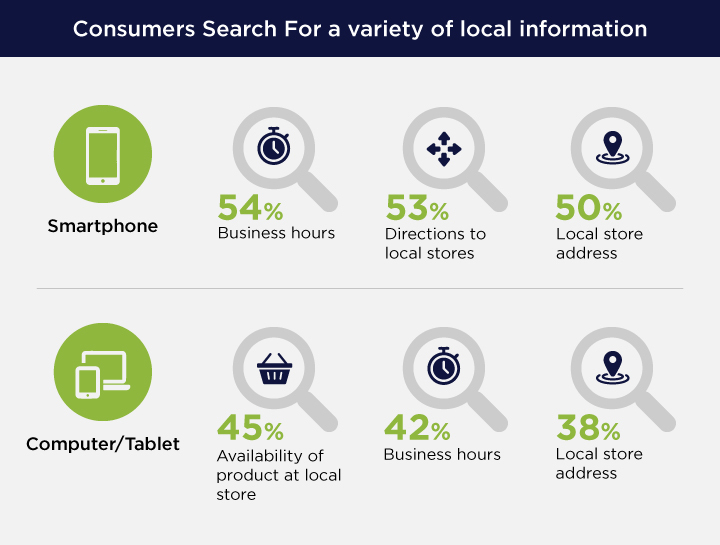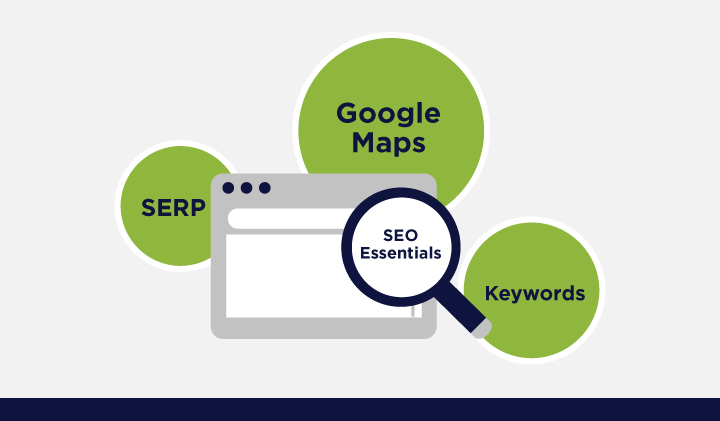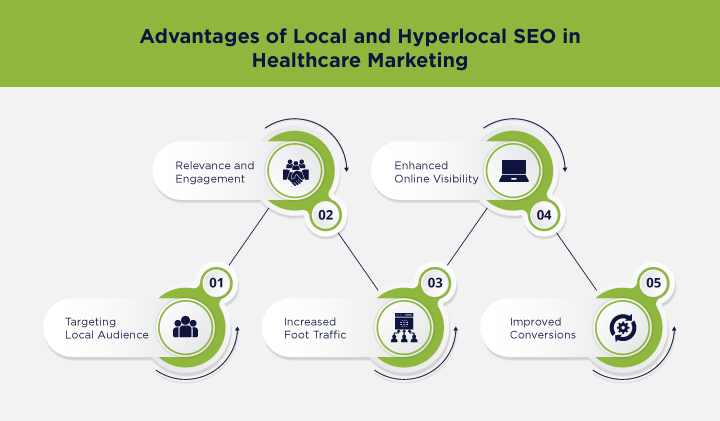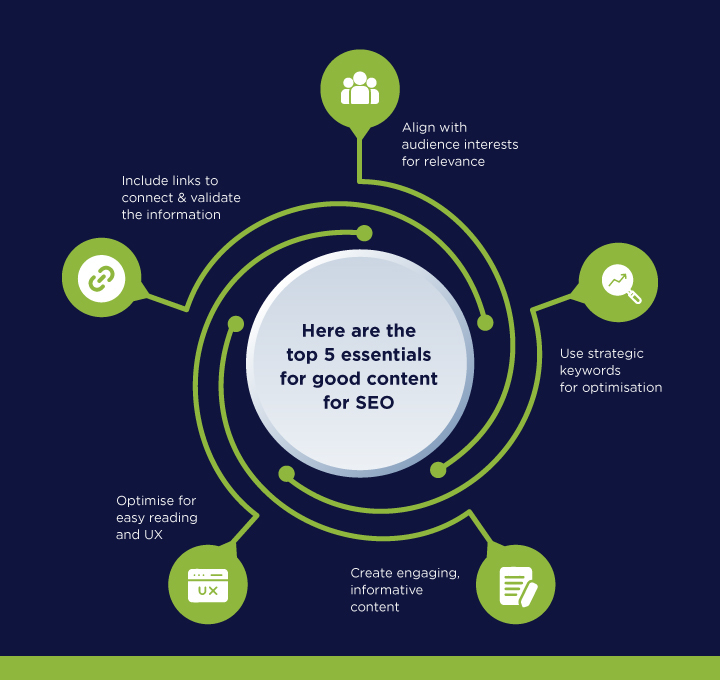Today, we have a wealth of information right at our fingertips. Whether it’s the latest smartphone or booking a dream vacation across the globe, the internet has it all. But let’s be real – we don’t have time to sift through irrelevant search results for groceries located miles away when we urgently need them nearby.
When it comes to medical emergencies, the stakes are even higher. The last thing anyone wants is to frantically search for ambulances only to discover they’re located far off. That’s where local SEO and hyperlocal SEO come into the picture. In this blog, we delve into the exciting world of local and hyperlocal SEO and uncover the secrets to unleashing the full potential of these strategies in healthcare marketing.
What is Local and HyperLocal SEO?
Do terms like “local SEO” and “hyperlocal SEO” sound like foreign terms to you? To put it in simpler words, local SEO and hyperlocal SEO enhance businesses’ visibility within specific geographic areas. Local SEO focuses on optimising a website to appear in local search results, while Hyperlocal SEO narrows the focus even further, targeting extremely localised searches. In 2022, a staggering 87% of consumers relied on Google to assess local businesses – a stat worth considering.

Source: healthcare success
This duo is of utmost significance in healthcare marketing due to the localised nature of patient searches.
Let’s understand this with an example. When you search for “dentists near me” or “hospitals in [city name]” on Google, Local SEO makes sure that the relevant healthcare practices in that city appear on the search results page. On the other hand, Hyperlocal SEO takes it a step further, providing results based on the user’s precise location, such as “dentists near [current location].”
SEO Essentials: SERP, Google Maps, and Keywords

Search Engine Result Page
The SERP displays the search results in response to a user’s query, and optimising for Local and Hyperlocal SEO ensures higher rankings, increasing the likelihood of getting noticed by potential patients.
Google Maps
Google Maps further enhances the user experience by displaying local business listings with easy-to-navigate directions, making it convenient for patients to find and reach nearby healthcare facilities.
SEO Keywords
The main ingredient of this recipe is SEO keywords. SEO keywords help optimise local search visibility. By incorporating location-specific keywords into website content, meta tags, and descriptions, healthcare businesses can better target local queries.
For instance, using keywords like “best dentist in [city name]” or “urgent care clinic near me” can significantly improve your business’s chances of appearing in relevant local search results.
Advantages of Local and Hyperlocal SEO in Healthcare Marketing

-
Targeting Local Audience
Local and Hyperlocal SEO strategies help healthcare businesses reach their immediate local community, ensuring their services are visible to potential patients in the area.
-
Relevance and Engagement
By tailoring content and keywords to local queries, healthcare marketers can connect with an audience that is actively seeking services in their vicinity, leading to higher engagement levels.
-
Increased Foot Traffic
Optimising for local searches can drive more patients to visit healthcare practices physically, resulting in increased foot traffic and potential for new patient acquisitions.
-
Enhanced Online Visibility
Implementing Local and Hyperlocal SEO ensures better online visibility in local search results, making it easier for patients to find and choose a specific healthcare provider.
-
Improved Conversions
When patients find relevant healthcare options nearby, they are more likely to convert into actual visitors, boosting the overall patient conversion rate and ultimately growing the healthcare business.
6 Local and Hyperlocal SEO Strategies to Power Up Your Healthcare Marketing
By tailoring these SEO strategies to target local audiences, healthcare practices can tap into the potential of attracting customers within their immediate vicinit
-
-
Google My Business (GMB) Optimization
-

Optimise your Google My Business (GMB) profile- it’s super important for your healthcare business. It’s like a golden ticket to online visibility and attracting more patients. People searching for services like yours want quick info to make decisions fast.
So, with a well-optimized GMB listing, you give them all the deets they need at their fingertips – contact info, working hours, and relevant categories. Plus, actively managing it shows you’re trustworthy and credible, leading to more foot traffic and conversions for your practice.
-
-
Reviews and Testimonials
-

Positive reviews and testimonials build trust and credibility among potential patients. When people read about others having great experiences, it makes them feel confident about choosing you over others. Ask your happy patients for reviews after appointments or in follow-up emails.
As per BrightLocal’s 2023 Local Consumer Review Survey, 87% of customers check online reviews for local businesses.
Now, you might be worried about negative feedback for your business, but don’t fret! Even negative feedback can be a good thing! Just handle it with care, show empathy, and be professional. It proves you care about improving patient experiences.
-
-
Local Directories and Citations
-

Local directories and citations are gold mines in healthcare marketing. They provide valuable information about your practice to search engines, increasing your visibility in local searches.
Pro Tip: keep your NAP (Name, Address, Phone) info consistent across all directories. It shows search engines you’re trustworthy, skyrocketing your local search rankings.
-
-
User-Friendly Website
-

A user-friendly website significantly enhances local SEO efforts for healthcare businesses. When a website is easy to navigate, it makes everyone happy – your visitors AND the search engine bots. Search engines recognise it as providing a positive user experience, improving its chances of ranking higher in local search results.
Here’s another Pro Tip: make sure your website is mobile-friendly.
Mobile responsiveness is crucial, considering the rising number of users accessing websites via mobile devices. Fast loading times further contribute to a seamless user experience, reducing bounce rates and increasing the likelihood of patient engagement.
-
-
Content Creation with Local Focus
-

Here are the top 5 essentials for good content for SEO
-
-
- Align with audience interests for relevance
- Use strategic keywords for optimisation
- Create engaging, informative content
- Optimise for easy reading and UX
- Include links to connect & validate the information
-
Content is indeed king! Creating content with a local focus is a crucial strategy for successful marketing in any industry. Customising your content to resonate with the local community establishes a strong connection and relevance among potential customers. This helps position your business as a valuable contributor to the community, effectively engaging its audience in a meaningful way.
-
-
Local Keywords and Long-Tail Phrases
-

Local keywords and long-tail phrases are crucial for targeting local search queries in healthcare marketing. Local keywords include location-specific terms, such as “dentist in [city name],” while long-tail phrases are more specific queries like “emergency dental care near me.”
Conducting keyword research involves identifying relevant local keywords and long-tail phrases commonly used by potential patients. Incorporating these keywords into website content, meta tags, and headings helps businesses rank higher in local search results, ensuring they reach their target audience effectively and attract local patients to their services.
Conclusion
Mastering the art of local and hyperlocal SEO can be a real game-changer for healthcare marketing. It’s like tapping into a hidden treasure trove. By harnessing the power of local searches and connecting with your community, you’ll become a valued contributor that attracts more patients to your doorstep.
But hey, we get it – navigating the digital landscape can be tricky. That’s where we come in! At Amura, we’re not just any healthcare marketing agency; we’re the experts in digital marketing for the healthcare industry. Our top-notch services and tools have helped brands like Glenmark Pharmaceuticals Limited, Cipla Health, URIHK, and Sun Pharma reach new heights of healthcare marketing online. From optimising your Google My Business profile to creating captivating content and implementing winning SEO strategies, our team does everything that’s best for your business. Reach out to us today!

